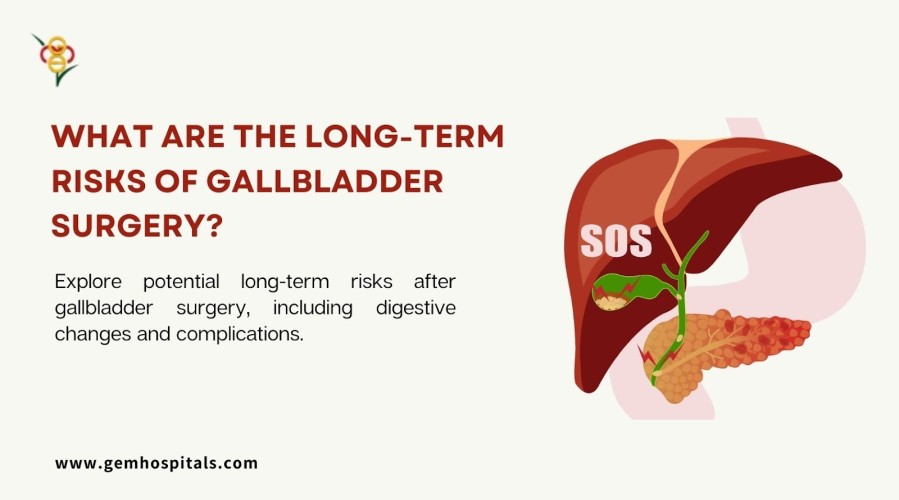Learn what gallstones are, their common symptoms, causes, and treatment options. Discover when to seek medical care and how to manage gallstone complications effectively.
What Are the Long-Term Risks of Gallbladder Surgery

Gallbladder even though the organ is small the function it does is vital but when there is a gallbladder issue it going to affect the digestive process and also has an impact on other organs. Usually when an individual is undergoing gallbladder issues first-line treatments are provided but if they are not effective and there are further disturbances the doctor may suggest getting gallbladder surgery. The gallbladder surgery is completely safe and effective but like any other medical procedure, it also holds certain risks and limitations which you have to get to know before thinking about the procedure. The most common question regarding the surgery is whether are there any long-term risks associated with gallbladder surgery, to get to know keep reading the content below.
Overview of gallbladder surgery
The liver secretes the digestive juice called bile which is stored in the gallbladder and then transported to the small intestine for aiding the fat substance digestion. In that case, when the gallbladder is removed for certain reasons there the bile directly falls into the small intestine. In general, there are two primary types of gallbladder surgery,
- Laparoscopic cholecystectomy is a minimally invasive technique where small incisions are made, through which the gallbladder is removed with the help of specialized instruments. This technique is highly preferred because of its shorter recovery time and lower risk of complications.
- Open cholecystectomy is an invasive procedure that creates a larger incision in the abdominal region. This will be opted for when the laparoscopy is not considered to be safe for that particular individual.
Long-term risks of gallbladder surgery
One of the most common long-term effects of gallbladder removal is associated with digestion. Generally, the gallbladder supplies the bile which assists in breaking down the fat particles but in case of the absence of a gallbladder there, their flow will be continuously into the intestines. This may lead to diarrhea, indigestion bloating, and gas.
Post-cholecystectomy syndrome is a kind of condition that can seen in some individuals after gallbladder removal. They may experience persistent symptoms like abdominal pain, nausea, bloating, and diarrhea. Even though the exact cause of this syndrome is not well understood, it is related to bile duct dysfunction, small bowel bacterial overgrowth, or changes in bile flow.
Bile duct injuries and strictures are rare, but it is considered to be one of the more serious long-term risks of gallbladder surgery. The condition may be due to an accidental cut or damaged bile duct it requires medical attention because that may also lead to serious complications including liver damage.
Managing long-term risks after gallbladder surgery
There are long-term risks of gallbladder surgery but still they can be managed with lifestyle changes, dietary adjustments, and medical treatment. Some of the tips to handle such situations are adopting a healthy diet with the presence of less fat substances, keeping yourself hydrated, regular exercises, taking essential nutritional supplements, and regular checkups. There are several steps that you have to follow post gallbladder surgery get proper guidance from your doctor they could take you on the right path and also avoid certain possible conditions after gallbladder removal.
The gallbladder surgery is considered to be a safe and effective procedure like any surgery it also comes with some sort of long-term risks which is associated with surgery. It may have an impact on a person’s health and quality of life but through proper understanding and knowing the managing steps you could keep yourself out of those possible complications. While you are experiencing uneasy situations it is good to consult a healthcare provider who may assist you in your overall well-being.
Get expert care for gall bladder issues at GEM Hospital. Our specialists provide advanced treatments and personalized care. Schedule your consultation now for optimal health and recovery.
Blogs & Article
Learn about bloating and gas problems, including common causes, symptoms, and effective solutions to improve digestion, reduce discomfort, and maintain gut health.
Learn how unverified Ayurveda treatments may cause liver damage, understand the risks, symptoms, and why medical guidance is essential for safe care.


